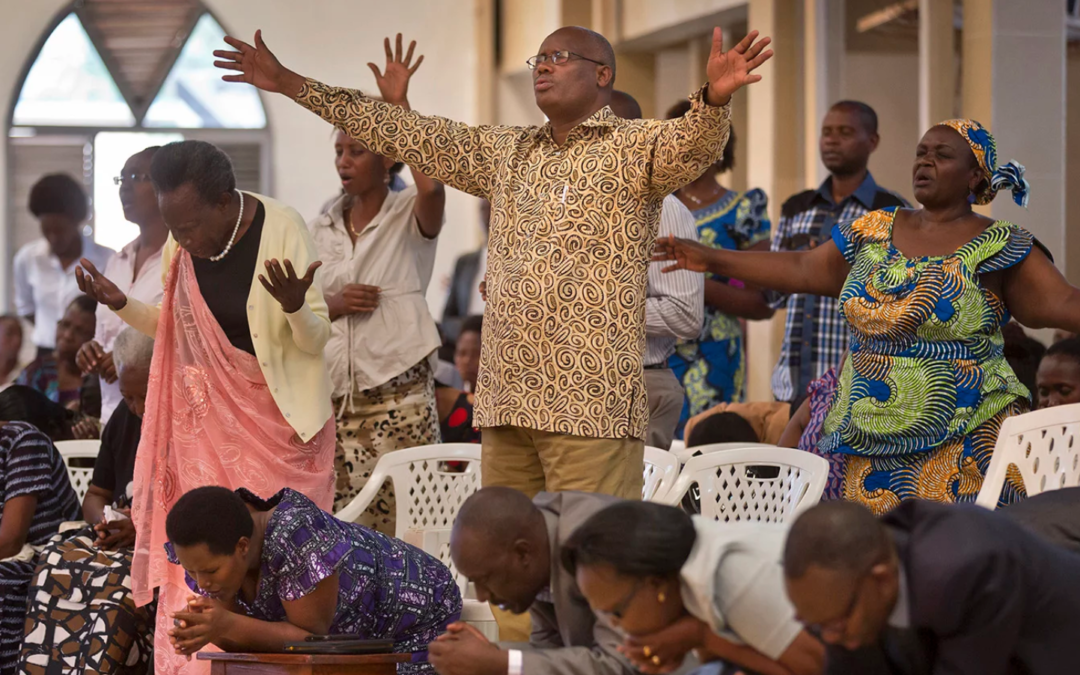
by Tonny Onyulo, RNS | Sep 9, 2018 | Headline News |
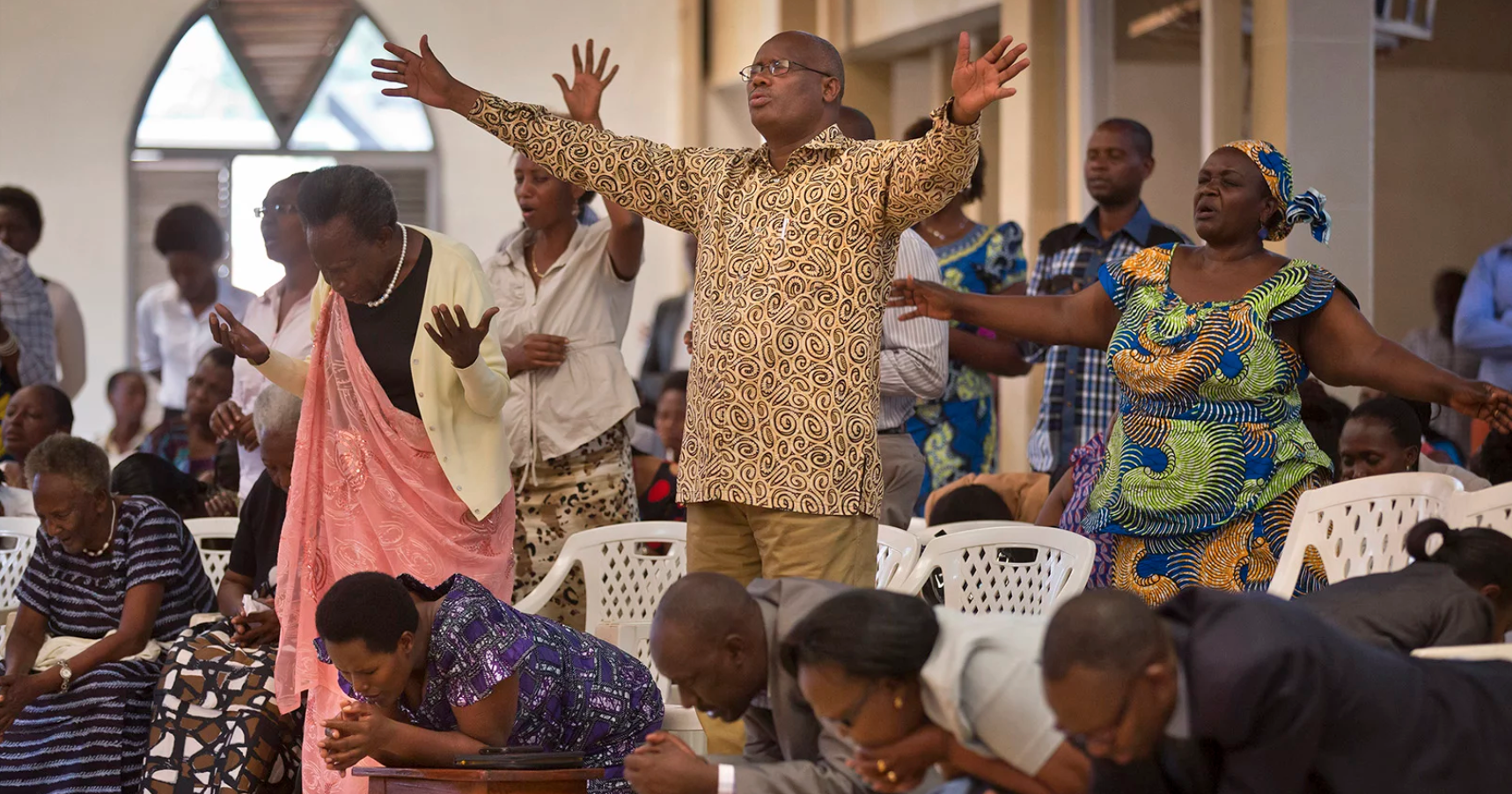
Rwandans sing and pray at the Evangelical Restoration Church in the Kimisagara neighborhood of the capital, Kigali, Rwanda, on April 6, 2014. Rwanda’s government has closed numerous churches and mosques in 2018 as it seeks to assert more control over a vibrant religious community whose sometimes makeshift operations, authorities say, have threatened the lives of followers. (AP Photo/Ben Curtis)
KIGALI, Rwanda – Grace Umutesi has secretly been conducting services in her house in the Bannyahe slum on the outskirts of the capital since officials shut down her church in July for failing to comply with building safety standards and other regulations.
“I’m very disappointed by the decision of the government to close our church,” said Umutesi, 35, a mother of four. “But we cannot stop to pray and praise God because our church has been closed. God is everywhere and he listens to our prayers.”
Umutesi, an elder at Joy Temple Ministries, said her church was closed because the pastor had no theological degree from an accredited institute as the government requires. She also said her church lacked proper toilets and bathrooms for guests and congregants — and can’t afford to comply with government regulations.
“It’s expensive for the church and it’s wrong for the government to tell us not to worship,” she said.
Joy Temple Ministries is one among thousands that authorities have shut down in recent months. An estimated 8,000 churches and 100 mosques have been closed across this East Africa nation of 12 million people, according to the government’s latest figures. Muslims comprise around 5 percent of the Rwandan population.
At the beginning of this year, Rwandan lawmakers enacted new laws requiring pastors to be educated and church buildings to be renovated, offer two bathrooms for men and women and provide paved access to churches on a half hectare of land or more.
Critics of President Paul Kagame said the crackdown is an extension of his long record of disregarding human rights. They say he has been clamping down on freedom of expression since he took power in 2000.
But the government has defended the move, saying it wanted to bring sanity in religious institutions and that it was not targeting any religion or church.
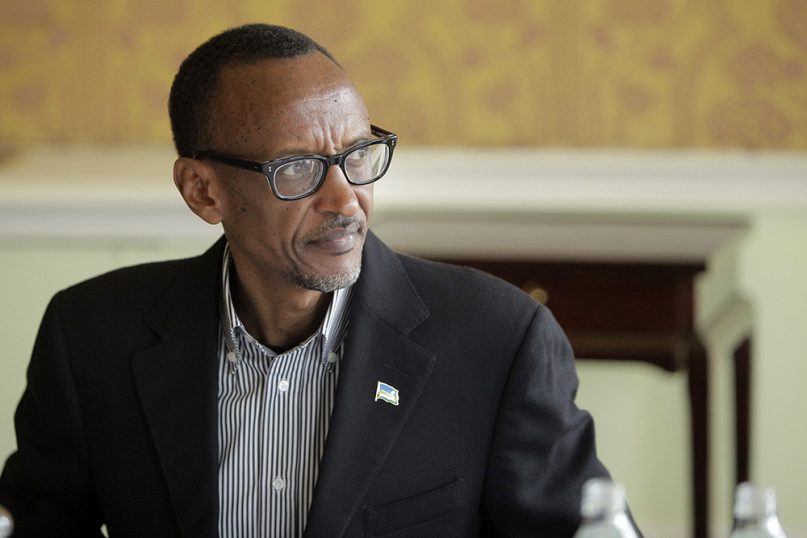
Rwanda President Paul Kagame in Dublin on March 23, 2014. Photo by John Ohle/Creative Commons
“We have freedom of worship in our country but that does not mean that you keep worshippers in a substandard house of worship that is likely to fall next day,” said Justus Kangwagye, a government official responsible for overseeing faith-based organizations in the country.
“We simply require churches to meet modest standards and all preachers to have theological training before opening a church.”
The new rules led to the closure of most Pentecostal churches where charismatic preachers draw huge followers because of purported miracles. Kagame has long accused Pentecostal pastors of using “fake” miracles to lure locals and enrich themselves. The authority arrested six pastors earlier this year for trying to defy government orders to close down churches. Those pastors were later released.
In response to the shutdowns, numerous worshippers have decided to conduct their worship services in their homes.
“Thousands of faithful are now secretly praying in their houses for fear of government crackdown,” said one senior pastor who did not want to be mentioned for fear of arrest.
“When the government arrested the six pastors,” he said, “it was like a stern warning to others not to resist the new laws on churches. We are feeling pain as pastors but we can’t talk about or discuss the issue. … How can leaders deny their people the right to worship freely?”
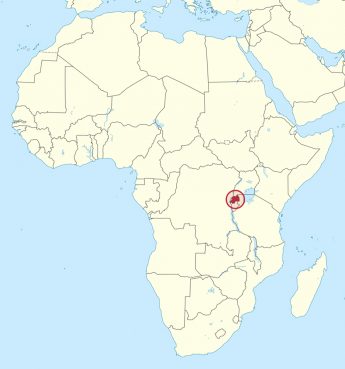
Rwanda, circled in red, in central Africa. Map courtesy of Creative Commons
Some faithful are walking for miles away from their homes every Sunday to look for other churches to worship in after their own were closed.
Esther Umohoza, who lives in Nyamirambo estate in the southwestern corner of Kigali, walks nine miles every Sunday to worship. She sometimes attends a Bible study at her neighbor’s house every Wednesday to keep close to God.
“Life has become hard, especially for Christians in this country,” she said. “You have to travel for a distance to seek God. But we are not going to give up on seeking God. I pray that the government revises these rules. We need churches to be everywhere so that people can pray freely.”
But Umutesi believes prayer will lead to changes in government policy. She hopes churches will reopen soon.
“We are praying God to change the government’s mind so that they don’t completely shut down churches,” she said. “We believe no leader can go against God, and if he does so, our country will be cursed.”
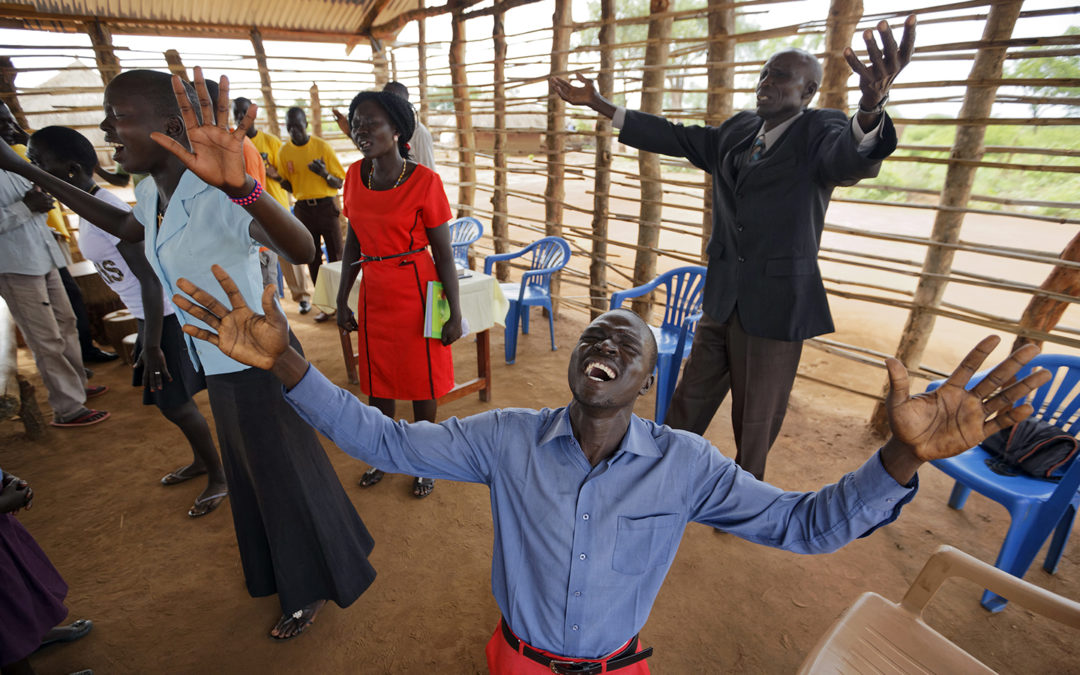
by Tonny Onyulo, RNS | Aug 9, 2018 | Headline News |
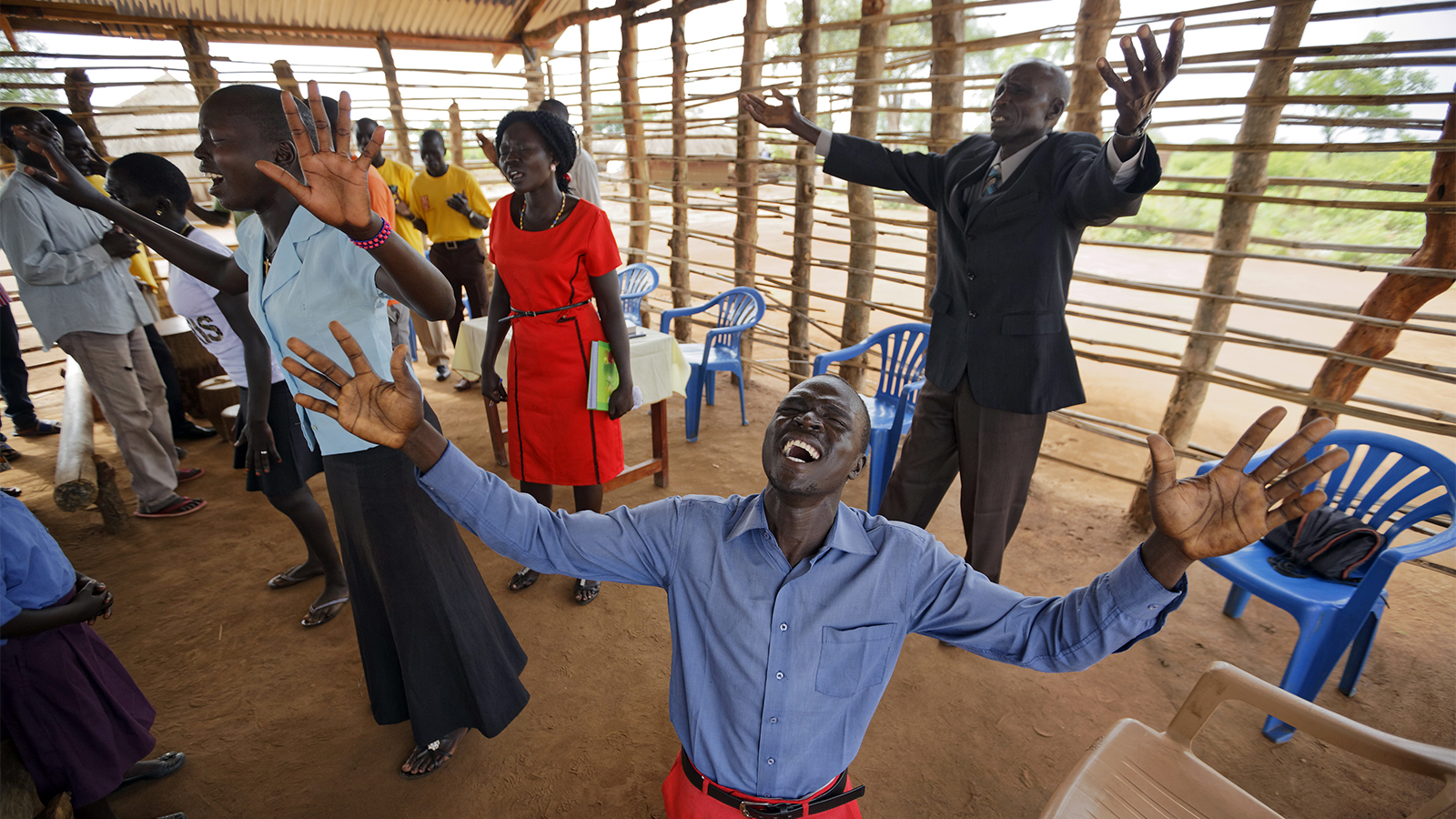
Preacher Daniel Rasash falls to his knees and weeps in prayer at the Yoyo Pentecostal Church in Bidi Bidi refugee camp in northern Uganda, on June 4, 2017. South Sudanese refugees meet in open-air churches rigged from timber with seats made only from planks of wood or logs drilled into the ground, yet these churches offer support among the daily humiliations that come with rebuilding their lives. (AP Photo/Ben Curtis)
BIDI BIDI REFUGEE CAMP, Uganda (RNS) – Every morning when Achol Kuol wakes up, she borrows a Bible from her neighbor and reads a verse to comfort herself before she meets others in an open-air church rigged from timber. They sing, dance and speak in tongues during the service. Some who feel filled with the Holy Spirit scream and jump — not with joy, but remorse.
Confessions flow as they recall the ones they killed in the civil war back home in South Sudan. They cry out, lamenting ordeals they endure at night. Others weep in prayer as they ask God for forgiveness.
“I can’t sleep unless I keep on praying,” said Kuol, 38, a mother of five. “I always have nightmares. In my dreams I go back to my old village and I see how my friends were shot dead. They keep on calling me, ‘Achol! Achol! Achol!’ And I would wake up screaming.”
For thousands of South Sudanese here in the world’s largest refugee camp, the search for healing from recent horrors involves a quest for God. Saddled with post-traumatic stress disorder in many cases, refugees are often encouraged by camp counselors to attend church as a pathway to healing.
“Many refugees usually go to church because it’s the only likely place in the camp where they can get help to recover from the trauma,” said Gabriel Mayen, a trauma counselor at Bidi Bidi. “The church gives them new hope, which is important to refugees and any person who has experienced trauma.”
South Sudan, the world’s youngest nation, broke into civil war in late 2013 when troops loyal to then-Vice President Riek Machar clashed with forces loyal to President Salva Kiir. The conflict spread quickly into an ethnic clash as the two leaders were representing two major tribes. Christianity is the majority religion in South Sudan.
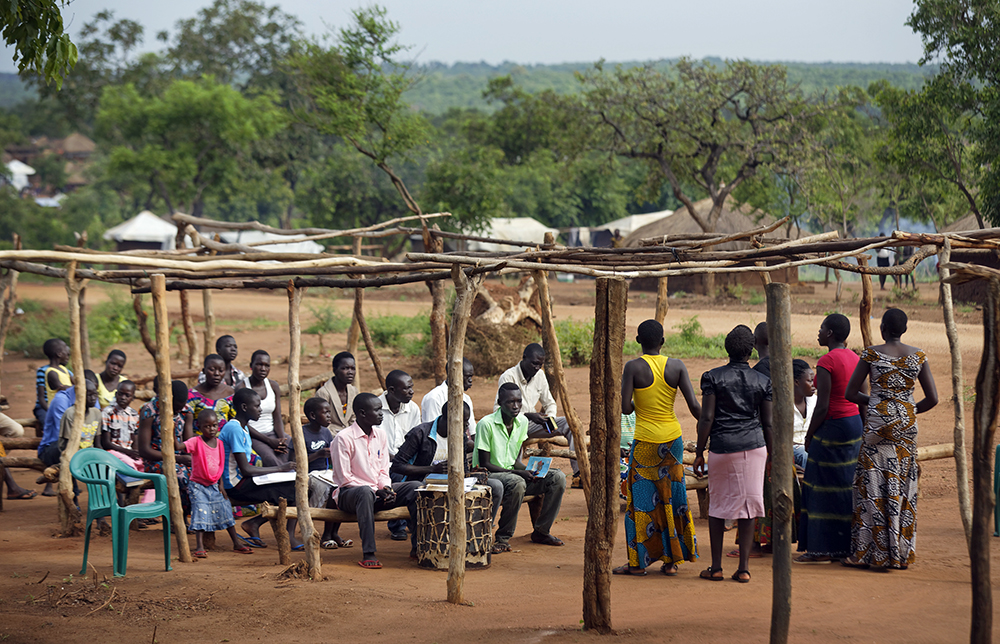
A congregation sits under an open-air wooden frame as they attend a Sunday service at a pentecostal church in Bidi Bidi refugee camp, in northern Uganda, on June 4, 2017. (AP Photo/Ben Curtis)
As a result, thousands have been killed, 2 million have been displaced in South Sudan, and another 2 million have sought refuge in neighboring countries. More than 1 million have fled to Uganda.
This camp, known as Bidi Bidi, is home to more than 250,000 people. Here, dozens of churches have cropped up and are becoming increasingly popular as the traumatized seek a foundation to put their lives back together.
Kuol’s husband was murdered in June last year when government soldiers attacked her town of Yei in southwest South Sudan. She fled with her children, arriving at Bidi Bidi three days later. One child died from hunger during the journey.
“I passed through a difficult time,” she said. “God saved me from death, and I had to accept him. In God I find peace, and I don’t have nightmares … though the memories of the killings still haunt me.”
More than 30 churches spread across the camp are headed by South Sudanese pastors, according to Ugandan officials. Many church leaders, including pastors, bishops, priests, evangelists and others, moved with their South Sudanese congregations into exile when civil war erupted.
“When these church leaders arrived at the camp, they began their own churches,” said Deng Bol, a refugee teacher and representative. “We have different denominations. Refugees have options here. If they want to go to Catholic or Protestant churches, they can go.”
Pastor John Deng of Christ Ministry Church fled South Sudan in 2016. He said his church is bringing together members of warring tribes, the Nuer and Dinka, and fostering cooperation across tribal lines. The church also provides emotional healing if one loses a family member at the camp or back home in South Sudan, he said.
“The church has played a vital role in unifying the people of South Sudan who had hated each other,” he said. “We are happy that people are living peaceful in the camp away from home.”
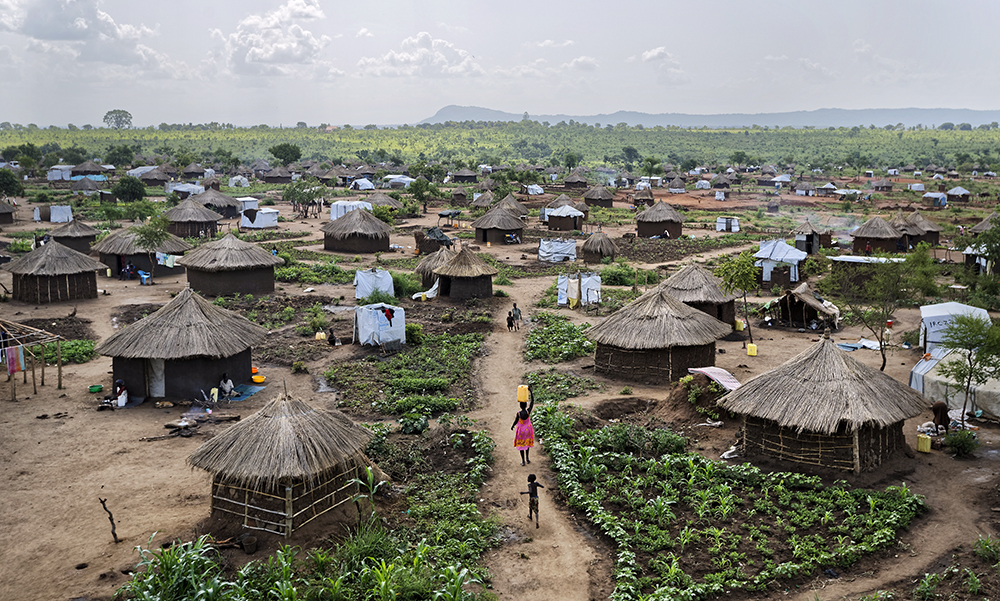
Women and children return home with plastic containers of water, in a section of the sprawling complex of mud-brick houses and tents that make up the Bidi Bidi refugee camp in northern Uganda on June 9, 2017. The number of South Sudanese refugees sheltering in Uganda reached 1 million in Aug. 2017, a grim milestone in what has become the world’s fastest-growing refugee crisis. (AP Photo/Ben Curtis)
Peace can be elusive at Bidi Bidi. Those traumatized by torture, rape and other violence often bring vengeful habits with them, Mayen said. Many drink alcohol in excess and become violent, he said.
“Some even take machetes and attack other refugees,” he said.
Spiritual warfare is a theme heard often around the camp. During a recent worship service, Deng warned the people of South Sudan that civil war in their country will not end until they turn to God and ask for forgiveness. Quoting from Proverbs 6:16-19, Deng said his home country was already under curse.
“Our country is cursed,” he said. “The only hope we have is heaven. It’s written that shedding someone’s blood is the work of the devil and anybody who is killing people is doing the work of the devil. We need to kneel down and ask God for forgiveness if we want him to bring peace in our country.”
The new churches make a point to offer hope. When rebel soldiers attacked Yei town last year in the middle of the night, Akur Piok and her husband escaped in different directions. Since then they have not once seen each other. Piok escaped with three of her children, leaving behind two.
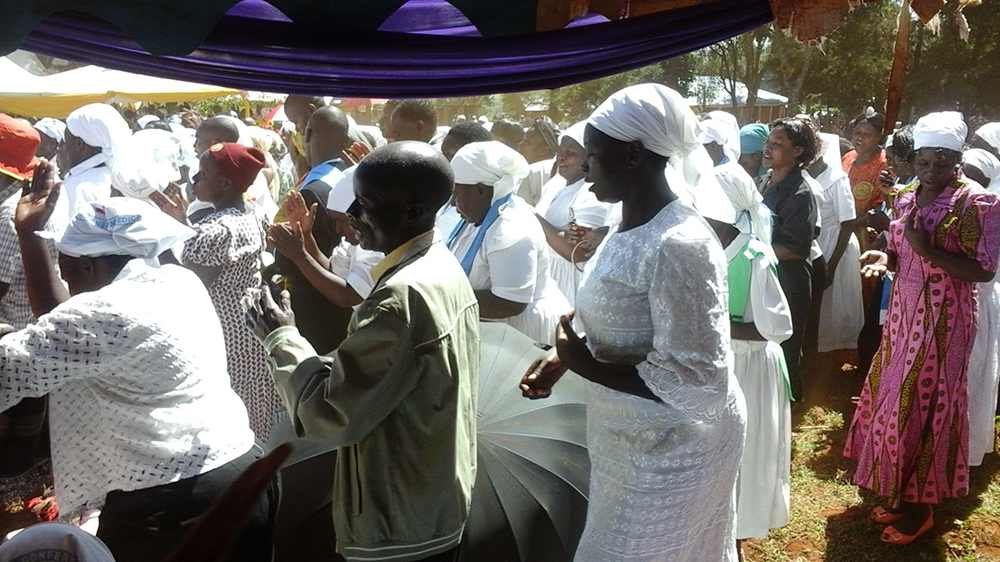
South Sudanese refugees meet in an open-air church at the Bidi Bidi refugee camp in northern Uganda on Feb. 15, 2018. Refugees pray for God to solve their challenges and bring peace in their country. RNS photo by Tonny Onyulo
“I’m traumatized,” she said as she walked toward the church. “I don’t know if my children and husband are still alive or dead. I have many problems. It’s only God who can solve them. I want to go and sing, worship and pray so that God can be the answer to my problems.”
Deng agreed. In his view, only God can solve the daunting challenges these refugees face.
“If you see them praying and crying, they have a reason: These refugees have problems,” he said. “They have no food to eat. No hospitals to take their families when they are sick, and their children are not going to school. The only hope they have is God.”
Kuol, a Dinka tribeswoman, credits God with sustaining her desire to live, despite her overwhelming troubles. Her church has helped her focus on the future rather than the past, she said. Her plans include a church wedding to her Nuer prayer partner.
“I don’t know where I would have been without God,” Kuol said. “I would have died a long time ago. I have so many problems that I sometimes think of committing suicide. But God always comes to my rescue.”









